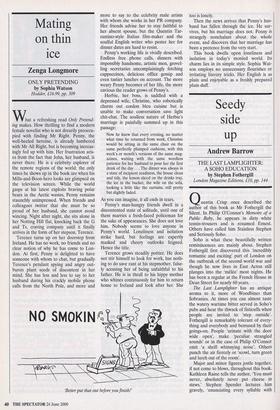Mating on thin ice
Zenga Longmore
ONLY PRETENDING by Sophia Watson Hodder, £16.99, pp. 309 What a refreshing read Only Pretend- ing makes. How thrilling to find a modern female novelist who is not drearily preoccu- pied with finding Mr Right. Penny, the well-heeled heroine, is already lumbered with Mr All Right, but is becoming increas- ingly fed up with him. Her frustration aris- es from the fact that John, her husband, is never there. He is a celebrity explorer of the remote regions of the world; the only times he shows up in the book are when his Mills-and-Boon-hero looks are glimpsed on the television screen. While the world gasps at his latest exploits braving polar bears in the Arctic wastes, Penny remains staunchly unimpressed. When friends and colleagues twitter that she must be so proud of her husband, she cannot avoid wincing. Night after night, she sits alone in her Notting Hill flat, knocking back the G and Ts, craving company until it finally arrives in the form of her stepson, Terence.
Terence turns up on her doorstep from Ireland. He has no work, no friends and no clear notion of why he has come to Lon- don. At first, Penny is delighted to have someone with whom to chat, but gradually Terence's petulant spying and angry out- bursts plant seeds of discontent in her mind. She has less and less to say to her husband during his crackly mobile phone calls from the North Pole, and more and more to say to the celebrity male artists with whom she works in her PR company. Her friends advise her to stay faithful to her absent spouse, but the Quentin Tar- rantino-style Italian film-maker and the soulful English writer who pester her for dinner dates are hard to resist.
Penny's working life is vividly described. Endless free phone calls, dinners with impossibly handsome, artistic men, grovel- ling secretaries uncomplainingly fetching cappuccinos, delicious office gossip and even tastier lunches on account. The more weary Penny becomes of her life, the more envious the reader grows of Penny's.
Herbie, her boss, is saddled with a depressed wife, Christine, who robotically churns out cordon bleu cuisine but is unable to make conversation save light chit-chat. The soulless nature of Herbie's marriage is painfully summed up in this passage:
Now he knew that every evening, no matter what time he returned from work, Christine would be sitting in the same chair on the same perfectly plumped cushions, with this week's or month's versions of the same mag- azines, waiting with the same wordless patience for her husband to pour her the first drink of the day The dinner was always in a state of incipient readiness, the house clean and tidy, the lemon sliced on the drinks tray, the ice in the bucket, the wife on the sofa, looking a little like the curtains, still pretty but slightly faded.
As you can imagine, it all ends in tears.
Penny's man-hungry friends dwell in a discontented state of solitude, until one of them marries a fresh-faced policeman for the sake of appearances. She does not love him. Nobody seems to love anyone in Penny's world. Loneliness and isolation strike hard, but feelings are expertly masked and cheery outlooks feigned. Hence the title.
Terence grows steadily pottier. He does not stir himself to look for work, has noth- ing to do save rant at his stepmother, false- ly accusing her of being unfaithful to his father. He is in thrall to his hippy mother who whines continuously for him to return home to Ireland and look after her. She Better put that out before you finish!' too is lonely.
Then the news arrives that Penny's hus- band has fallen through the ice. He sur- vives, but his marriage does not. Penny is strangely nonchalant about the whole event, and discovers that her marriage has been a pretence from the very start.
This book dwells upon loneliness and isolation in today's monied world. Its charm lies in its simple style. Sophia Wat- son employs no unnecessary flourishes or irritating literary tricks. Her English is as plain and enjoyable as a freshly prepared plum duff.


































































 Previous page
Previous page